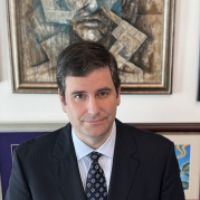Miami White Collar Crime Lawyer, Florida
Sponsored Law Firm
-
 x
x

Click For More Info:
-
The Law Offices of Richard L. Cooper, P.A.
848 Brickell Avenue Suite 800 Miami, FL 33131» view mapDWI/DUI, Drug Trafficking, Felony Nationally Ranked Top 40 Under 40
With Richard L. Cooper you can expect a trusted confidant who will work diligently to fully understand your case and determine a road map to help you regain control of your life.
800-756-2781
Ayuban Antonio Tomas
✓ VERIFIEDTax, Criminal, Tax Litigation, Felony, White Collar Crime
A. Antonio Tomas is a Board Certified Tax Lawyer, Board Certified Criminal Trial Lawyer and a Certified Public Accountant. Mr. Tomas's practice foc... (more)
Benjamin James Lucas
Employment Discrimination, White Collar Crime, Criminal, Personal Injury, Accident & Injury
Donald I. Bierman
Criminal, Licensing, Professional Responsibility, White Collar Crime
Status: In Good Standing
Jeffrey S. Weiner
International, Federal Appellate Practice, White Collar Crime, Criminal, Civil Rights
Status: In Good Standing
FREE CONSULTATION
CONTACTRonald Joseph Manto
Federal Appellate Practice, White Collar Crime, Misdemeanor, Felony
Status: In Good Standing Licensed: 30 Years
FREE CONSULTATION
CONTACTClayton Reed Kaeiser
Litigation, White Collar Crime, DUI-DWI, Criminal
Status: In Good Standing Licensed: 42 Years
Charles Clifford Harper
White Collar Crime, Elder Law, Business & Trade, Banking & Finance
Status: In Good Standing Licensed: 50 Years
Nelson Camilo Bellido
Litigation, Employee Rights, White Collar Crime, Criminal
Status: In Good Standing Licensed: 32 Years

 Richard L. Cooper Miami, FL
Richard L. Cooper Miami, FL AboutMiami Attorney at Law
AboutMiami Attorney at Law ServicesCriminal Defense
ServicesCriminal Defense


